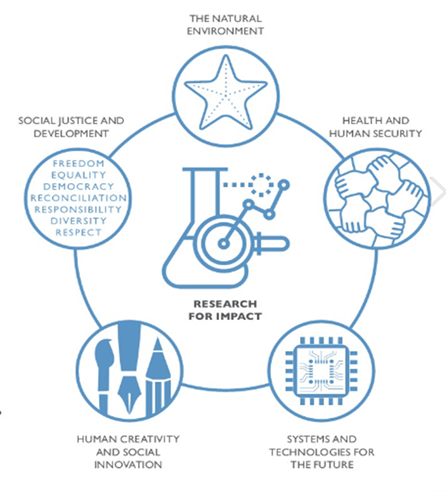
Stellenbosch University (SU) is a place of discovery and excellence, where students and staff are thought leaders in advancing knowledge in the service of all stakeholders. Its mission is to attract outstanding students, employ talented staff and provide a world-class environment: a place connected to the world, while enriching and transforming local, continental and global communities.
Research for Impact is therefore one of the six major institutional strategic themes as part of SU`s Strategic Framework 2019 – 2024. Research for Impact at SU implies optimising the scientific, economic, social, scholarly and cultural impact of our research. Our focus is on interdisciplinary research that benefits society on a national, continental and global scale. At the same time, we are committed to basic and disciplinary research excellence, as it forms the basis for applied and translational research.
SU wishes to achieve this by pursuing excellence, remaining at the forefront of its chosen focus areas, gaining standing based on its research outputs, and being enterprising, innovative and self-renewing. This requires a careful balance between, on the one hand, continuity and consistency and, on the other, transformation and rejuvenation of SU’s academic researcher cohort. At the same time, SU research strives to be socially relevant. Ultimately, our research efforts are not only aimed at academic success, but also at making a significant impact in the world.
With due cognisance of the challenges of relevance and significance, and in the light of the developmental needs of our region, SU has identified five strategic research areas (SRAs) that will drive the research agenda for the next few years:

The SRAs allows the University to strategically cluster, support and grow its existing research initiatives, with a strong focus on strengthening trans-disciplinary research collaboration, societal impact, and sustainability. Under each of the broad SRAs, we are now focusing on the establishment of new “high rises” that will continue to transform our research portfolio.
Latest research successes
(as at April 2022):
According to the Department of Higher Education and Training (DHET) SU has had the highest per capita research output for 6 of the past eight years. SU also holds the highest number of Patent Cooperation Treaty (PCT) applications in SA, including other universities, companies and research councils (e.g. CSIR). Furthermore, SU has graduated year on year record numbers of masters and doctoral students for the past six years. SU has also had the best retention and success rates with regard to postgraduate students in SA. We have also been successful in maintaining the number of Postdoctoral Fellows at <300-370 per year of which 44% are international. The number of sponsored research chairs are 43, including 25 research chairs sponsored by the Department of Science and Innovation (DSI).
A number of successful research entities were also established building on our strengths, including a DSI Centre of Excellence in Scientometrics, the School for Data Science and Computational Thinking, School for Climate Studies, the Centre for Epidemic Response and Innovation, and the Centre of the Study of Afterlife of Violence and the Reparative Quest (AVReQ). The number of NRF rated researchers has increased from 313 in 2013 to 484 in 2022 indicating the depth of our knowledge base and how this has improved over the past 6 years. In terms of international rankings, SU has been amongst the top three universities in SA.
SU continued its standing as one of Africa’s leading universities in the 2022 QS World University Rankings by Subject. SU improved its standing in Life Sciences and Medicine from 269 to 265 and achieved the top ranking of South African universities in Agriculture and Forestry (76th in the world), as well as Theology, Divinity and Religious Studies (within top 100 globally). SU also remains in the top 350 in the world in Arts and Humanities, top 400 in Social Sciences and Management, and top 500 in Natural Sciences.

